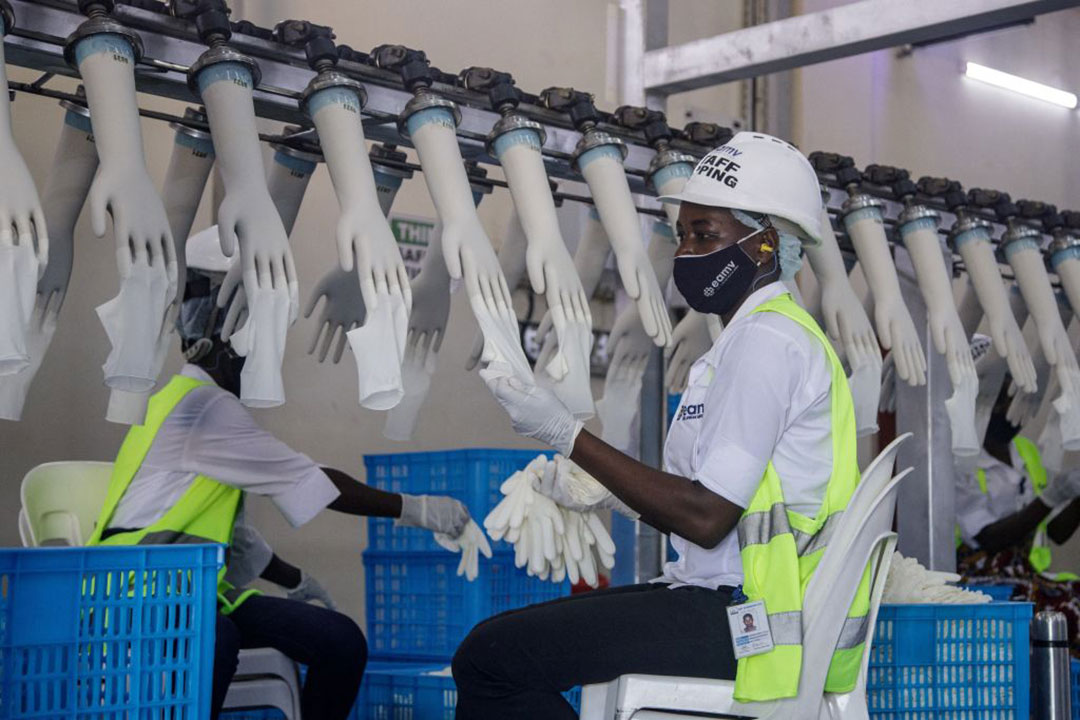Ibrahim Foundation: Road to COVID-19 Recovery Must Start Now
ADF STAFF
As Africa works to recover from the widespread impact of the COVID-19 pandemic, the Mo Ibrahim Foundation has identified 10 key challenges it says the continent must overcome to make up lost ground and move forward.
“COVID-19 in Africa: A Challenging Road to Recovery” draws on a decade of research by the Ibrahim Index of African Governance (IIAG) to identify 10 challenges covering health, social and economic issues. Taken together, all the challenges focus on improving functionality and accountability for governments and public health departments in the face of COVID-19 and future pandemics.
“The COVID-19 pandemic has proven, once again, that Africa will be left behind unless we build the capacity to produce the medical products our population needs,” wrote Professor Agnes Binagwaho, vice chair of the Africa-Europe Foundation Health Strategy Group. Binagwaho was among the public health experts featured in the foundation report.
Here are some of the report’s highlights:
Better Vital Statistics Data
Throughout the pandemic, public health experts have struggled to calculate the true impact of COVID-19 on the continent because so few countries keep accurate birth and death records.
Although birth reporting has improved, death reporting has declined during the pandemic. Only eight countries have a universal system of registering deaths. As a result, the World Health Organization (WHO) estimates that Africa’s true death toll from COVID-19 may be three times higher than the official tally.
“The COVID-19 pandemic has added further strain to the already weak civil registration capacity at a time where this is more critical than ever for the delivery of public health policies, vaccines and social protection,” the report’s authors said.
Better Access to Affordable Health Care
All African countries have committed to providing universal health care by 2030, but so far only 10 countries — Algeria, Botswana, Burkina Faso, Gabon, Mauritius, Namibia, Rwanda, Seychelles, Tunisia and Zambia — have achieved that goal.
In Sub-Saharan Africa, the average spending on health care is about one-third of the global average. The demand caused by COVID-19 patients has forced countries to shift scarce resources away from other needs such as tuberculosis, HIV and cancer treatments.
A WHO Africa survey found that about one-third of countries reported disruptions to emergency and critical care services because of the pandemic. The continent’s lack of spending on health care also is causing a brain drain as African-trained doctors leave for jobs in other parts of the world.
Preparation for Future Pandemics
Although nations earned praise for their quick response at the outset of the pandemic, COVID-19 quickly revealed a lack of capacity because there were shortages of intensive-care beds, medical oxygen and personal protective gear.
“More generally, it [the pandemic] has exposed the continent’s insufficient human capacities and challenging infrastructure environment,” the report’s authors wrote.
With new diseases passing from animals to humans (the presumed path of COVID-19) each year, a new pandemic is inevitable, the report’s authors said.
“COVID-19 is not an anomaly,” they said, “and investing in preparedness is key.”
That means Africa must become more self-sufficient in health care, according to Binagwaho. African nations also must strengthen their social safety nets to prepare for future pandemics, the report said.
Rebuilding Civic Spaces
Lockdowns and other COVID-19 restrictions accelerated the shrinking of the continent’s civil society, including media freedom, that has been going on for several decades. “Pre-existing restrictions to civic space have been accelerated by the use of either excessive measures or by keeping emergency provisions in place for extended time periods,” the report stated.
Faith in political leaders also has suffered during the pandemic: Nearly two-thirds of people surveyed by Afrobarometer pollsters said they worried that their political leaders were using the pandemic as cover to abuse their own power.
“It has become more difficult for civil society organizations to be established and operate, while they also face higher levels of harassment,” the report said.
Media restrictions and censorship of citizen-created political content also are rising continentwide.
Along with these issues, the foundation’s report sees challenges for Africa’s post-COVID-19 future in education, women’s and girls’ lives, the social safety net, digital equity, consistent energy supplies, and reliable transportation networks. The full report is here [insert link: https://mo.ibrahim.foundation/covid-19-africa-challenging-road-recovery].
“Each country’s capacity to navigate and eventually move past the pandemic will be rooted in citizen trust,” the report said.


Comments are closed.